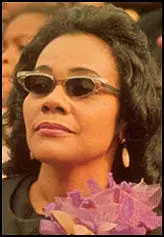Coretta Scott King

Coretta Scott was born in Marion, Alabama, on 27th April, 1927. Her father was a lumber carrier who did badly during the Great Depression. The family was so poor that Coretta had to walk three miles to school every day.
After graduating from Antioch College in Ohio in 1951, she enrolled at the New England Conservatory of Music in Boston. In 1953 Coretta married Martin Luther King and over the next few years gave birth to four children.
King became pastor of the Dexter Avenue Baptist Church in Montgomery, Alabama. Coretta was active in the civil rights movement and took part in the Montgomery Bus Boycott and the famous March on Washington in August, 1963.
After the assassination of Martin Luther King Coretta continued to campaign for equal rights and founded the Center for Non-Violent Social Change in Atlanta. Her book, My Life with Martin Luther King was published in 1969.
Coretta's greatest success was in establishing Martin Luther King Day, commemorating her husband's birthday on January 15 as a US national holiday.
Coretta Scott King died in her sleep on 31st January, 2006.
Primary Sources
(1) Godfrey Hodgson, The Guardian (1st January, 2006)
In 1953, Coretta and Martin were married by his father, Dr Martin Luther King Sr, one of the leading African-American ministers in Atlanta. The black south was on the eve of dramatic change. School systems were all segregated, with states spending substantially less money on each African-American pupil than on whites. Social and residential segregation remained virtually absolute.
In 1954, however, the US supreme court, in the case of Brown v the school board of Topeka, Kansas, found that separate schools could not be considered equal, thus overturning more than 60 years of southern custom. But change was slow in following. A year later, the court ordered states to comply "with all deliberate speed". But southern white politicians resisted desegregation, and where necessary local police forces used violence as well as legal penalties to enforce what was trumpeted as being the "southern way of life".
King took up the post of pastor at the Dexter Avenue Baptist church in Montgomery, Alabama, a black church literally in the shadow of the state capitol building in what had been briefly the capital of the Confederacy. In 1955 Montgomery's African-Americans, led by Rosa Parks (obituary, October 26 2005) and the veteran ED Nixon, organised a boycott of the city's buses after Parks refused to give up her seat to a white passenger. Racial tension was high, and the Kings' house was firebombed.
In 1962, King began a series of what were, in effect, non-violent raids on one southern town after another: Albany, Georgia; St Augustine, Florida, and - climactically - Birmingham, the big, hard steel town in central Alabama.
(2) Michael Honey, Seattle Times (2nd April, 2006)
As they watched the television coverage of President Kennedy's assassination in Dallas in 1963, Dr. King told her, "This is what is going to happen to me." She accepted this reality, not morbidly, but as a fact of life. She told a Seattle audience in 1965, "You realize that what you are doing is pretty dangerous, but we go on with the faith that what we are doing is right. If something happens to my husband, the cause will continue. It may even be helped." She did not flinch, and raised four children in the context of two lives absolutely committed to changing the world.
Mrs. King opposed the Vietnam War, and prodded her husband to publicly speak out against it, and he came under increasing attack as a traitor to his country when he did so. She took his place leading peace demonstrations in San Francisco and Washington, D.C., and presided at a Women's International League for Peace and Freedom conference, where she declared, "All women have a common bond — they don't want their husbands and sons maimed and killed in war."
An assassin finally snuffed out Dr. King's life on April 4, 1968, while he led a strike of 1,300 black sanitation workers - the working poor of their day - to demand the right to have a union. Many whites in Memphis, calling him a communist and racial agitator, said they were glad he was dead.
In this frightening atmosphere, Mrs. King and three of her children led some 20,000 marchers through the streets of Memphis on April 8, holding signs that read, "Honor King: End Racism," "Union Justice Now," or, simply, "I Am A Man." National Guardsmen lined the streets, perched on M-48 tanks, bayonets mounted, as helicopters circled overhead. She led another 150,000 in a funeral procession through the streets of Atlanta the next day.
Her quiet courage and composed demeanor renewed people's sense of pride, courage and respect for the peaceful principles the civil-rights movement stood for. In the wake of King's death, riots spread to 125 cities, leading to the deaths of 43 and arrests of more than 20,000 people, with the deployment of 60,000 National Guardsmen to suppress the rebellion - the largest military intervention in domestic affairs since the Civil War...
In her first pronouncement after her husband's death, Mrs. King said, "He gave his life for the poor of the world, the garbage workers of Memphis and the peasants of Vietnam. The day that Negro people and others in bondage are truly free, on the day want is abolished, on the day wars are no more, on that day I know my husband will rest in a long-deserved peace."
The same can be said for her. But there can be no rest for those of us who follow the dream.
